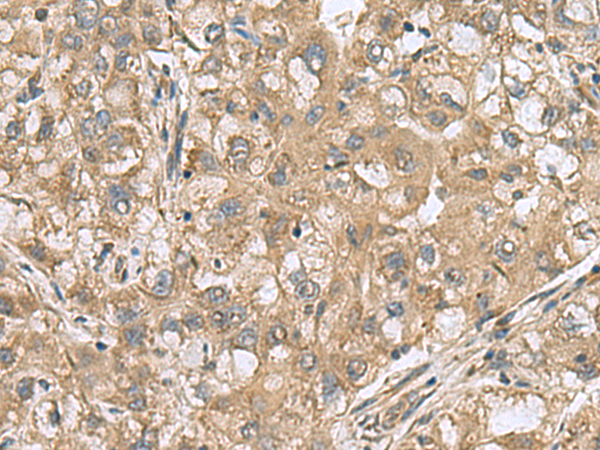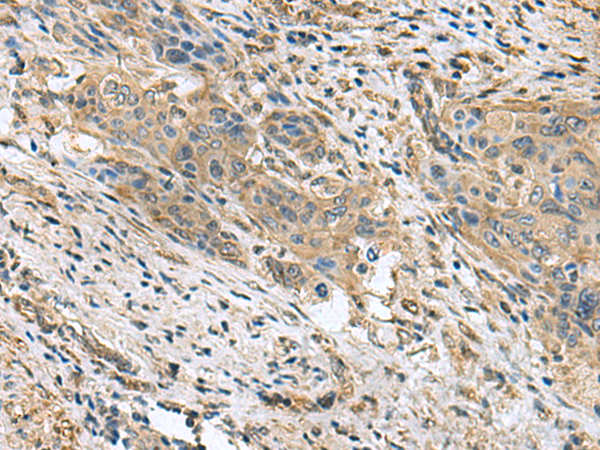

| WB | 咨询技术 | Human,Mouse,Rat |
| IF | 咨询技术 | Human,Mouse,Rat |
| IHC | 1/50-1/300 | Human,Mouse,Rat |
| ICC | 技术咨询 | Human,Mouse,Rat |
| FCM | 咨询技术 | Human,Mouse,Rat |
| Elisa | 1/5000-1/10000 | Human,Mouse,Rat |
| Aliases | SK2; BCYM4; ATPSK2 |
| Host/Isotype | Rabbit IgG |
| Antibody Type | Primary antibody |
| Storage | Store at 4°C short term. Aliquot and store at -20°C long term. Avoid freeze/thaw cycles. |
| Species Reactivity | Human, Mouse |
| Immunogen | Fusion protein of human PAPSS2 |
| Formulation | Purified antibody in PBS with 0.05% sodium azide and 50% glycerol. |
+ +
以下是关于PAPSS2抗体的3篇参考文献的简要概括(文献信息为示例性内容,实际引用需核实原始文献):
1. **文献名称**:*"Mutations in orthologous genes in human skeletal dysplasia"*
**作者**:Uludag, A., et al.
**摘要**:该研究通过免疫印迹和免疫组化分析,使用PAPSS2特异性抗体,揭示了PAPSS2基因突变导致骨骼发育不良(如SEMD巴基斯坦型)的分子机制,证明突变会显著降低酶活性及硫酸化蛋白表达。
2. **文献名称**:*"Sulfation pathway dysregulation in breast cancer: Role of PAPSS2"*
**作者**:Anower-E-Khuda, M.F., et al.
**摘要**:利用PAPSS2抗体检测乳腺癌组织中该酶的表达水平,发现PAPSS2低表达与硫酸化雌激素代谢异常相关,提示其可能通过影响激素活性促进肿瘤进展。
3. **文献名称**:*"PAPSS2 deficiency alters cartilage extracellular matrix composition"*
**作者**:Li, H., et al.
**摘要**:通过PAPSS2抗体进行小鼠模型软骨细胞蛋白定位研究,发现PAPSS2缺陷会导致硫酸化糖胺聚糖合成减少,从而影响软骨基质完整性,为相关代谢性骨病提供机制解释。
注:以上内容为模拟示例,实际文献需检索PubMed或Google Scholar获取准确信息。
The PAPSS2 (3'-phosphoadenosine 5'-phosphosulfate synthase 2) antibody is a tool used to detect and study the PAPSS2 enzyme, a critical player in sulfur metabolism. PAPSS2 catalyzes the synthesis of 3'-phosphoadenosine 5'-phosphosulfate (PAPS), the universal sulfate donor for sulfation reactions. These reactions are essential for post-translational modifications of proteins, proteoglycans, and steroids, influencing extracellular matrix structure, cell signaling, and hormone regulation.
Research on PAPSS2 is closely tied to skeletal development and connective tissue disorders. Mutations in the PAPSS2 gene are linked to autosomal recessive brachyolmia and spondyloepimetaphyseal dysplasia (SEMD), characterized by short stature, skeletal deformities, and joint abnormalities. The antibody aids in studying PAPSS2 expression patterns in tissues like cartilage, liver, and growth plates, where its activity is crucial for sulfation of glycosaminoglycans (e.g., chondroitin sulfate) in proteoglycans, ensuring proper bone and cartilage formation.
In experimental models, PAPSS2 antibodies are employed in techniques like Western blotting, immunohistochemistry, and immunofluorescence to assess protein localization, expression levels, and interactions. They also help explore PAPSS2's role in metabolic syndromes, steroid hormone regulation, and cancer progression, where altered sulfation may influence tumor microenvironment and metastasis. Validating antibody specificity through knockout controls is critical due to potential cross-reactivity with related isoforms like PAPSS1.
×